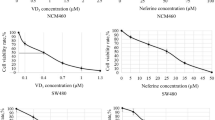Abstract
Vitamin D has the capability to inhibit tumor cell proliferation and promote tumor cell apoptosis but whether this mechanism exists in lung adenocarcinoma cells remains to be studied. Our objective is to explore whether vitamin D has the capability to inhibit lung adenocarcinoma cell proliferation and synergize with cisplatin. Our method was to explore the effect of different concentrations of 1,25(OH)2D3 with or without cisplatin on lung adenocarcinoma cells by detecting cell proliferation rates at different time points. 1,25(OH)2D3 was capsulated with nanomaterial before acting on lung adenocarcinoma cells, and cell proliferation rates at different time points were detected with the CCK-8 method. When vitamin D was applied at a concentration of 1 × 10−7 and 1 × 10−6 mol/L on A549, PC9, SPC-A1, and H1650 cells for 72 h, no inhibition occurred on cell proliferation. Between the concentrations of 1 × 10−5 and 0.5 × 10−5 mol/L, inhibition on cell proliferation increased with drug action time. Between the concentration of 2.5 × 10−5 and 0.03 × 10−5 mol/L, inhibition on cell proliferation increased with increasing drug concentration. Analysis using bivariate correlations showed that the correlation coefficient of the proliferation inhibition rate and drug content was 0.580 (p < 0.0001). The correlation coefficient of proliferation inhibition rate and the drug action time was 0.379 (p = 0.01). The combined use of vitamin D and dichlorodiammine-platinum(II) (DDP) significantly increased the inhibition rate on A549 cell proliferation, which peaked after culturing for 96 h (Table 4). Further analysis using bivariate correlations showed that the correlation coefficient between proliferation inhibition rate and DDP concentration was 0.319 (p < 0.0001). The correlation coefficient of the proliferation inhibition rate and vitamin D concentration was 0.269 (p < 0.0001). The correlation coefficient of proliferation inhibition and drug action time was 0.221(p = 0.003). Vitamin D capsulated with nanomaterial (5 ng/ml) on PC-9 cells for 72 h did not inhibit cell proliferation, while after 10 days, the content of crystal violet dissolved decreased by 6.3 ± 3.2 % for the nonleaded nanomaterial group and decreased by 45.8 ± 10.9 % for the nanomaterial-capsulated vitamin D group (p < 0.0001). Vitamin D has the capability to inhibit the proliferation of lung adenocarcinoma cells, synergistically inhibit the proliferation of lung adenocarcinoma cells with DDP, and when capsulated with nanomaterial can significantly inhibit the proliferation of lung adenocarcinoma cells.



Similar content being viewed by others
References
Jemal A, Siegel R, Ward E, Hao Y, Xu J, Thun MJ. Cancer statistics, 2009. Ca Cancer J Clin. 2009;59:225–49.
Cindy Davis D. Vitamin D and cancer: current dilemmas and future research needs. Am J Clin Nutr. 2008;88(suppl):565S–9S.
Li R, Wu J, Xiong L, Han B. Lung cancer and benign lung diseases in patients with serious vitamin D deficiency in eastern China. Thoracic Cancer. 2012;3(4):303–6.
Afzal S, Bojesen SE, Nordestgaard BG. Low plasma 25-hydroxyvitamin D and risk of tobacco-related cancer. Clin Chem. 2013;59(5):771–80.
Cheng TY, Neuhouser ML. Serum 25-hydroxyvitamin D, vitamin A, and lung cancer mortality in the US population: a potential nutrient-nutrient interaction. Cancer Causes Control. 2012;23(9):1557–65.
Ma Y, Yu WD, Hidalgo AA, Luo W, Delansorne R, Johnson CS, et al. Inecalcitol, an analog of 1,25D3, displays enhanced antitumor activity through the induction of apoptosis in a squamous cell carcinoma model system. Cell Cycle. 2013;12(5):743–52.
Reungwetwattana T, Eadens MJ, Molina JR. Chemotherapy for non-small-cell lung carcinoma: from a blanket approach to individual therapy. Semin Respir Crit Care Med. 2011;32(1):78–93.
Ordóñez-Mena JM, Schöttker B, Haug U, Müller H, Köhrle J, Schomburg L, et al. Serum 25-hydroxyvitamin d and cancer risk in older adults: results from a large german prospective cohort study. Cancer Epidemiol Biomarkers Prev. 2013;22(5):905–16.
Hossein-Nezhad A, Spira A, Holick MF. Influence of vitamin d status and vitamin d3 supplementation on genome wide expression of white blood cells: a randomized double-blind clinical trial. PLoS One. 2013;8(3):e58725.
Xiong L, Cheng J, Gao J, Wang J, Liu X, Wang L. Vitamin D Receptor Genetic Variants are Associated With Chemotherapy Response and Prognosis in Patients With Advanced Non-Small-Cell Lung Cancer. Clin Lung Cancer. 2013.
Thyer L, Ward E, Smith R, Fiore MG, Magherini S, Branca JJ, et al. A novel role for a major component of the vitamin D axis: vitamin D binding protein-derived macrophage activating factor induces human breast cancer cell apoptosis through stimulation of macrophages. Nutrients. 2013;5(7):2577–89.
Acknowledgments
This work was funded by grants 81101770 and 81201839 of the National Natural Science Foundation of China.
Conflicts of interest
None
Author information
Authors and Affiliations
Corresponding authors
Additional information
Statement of translational relevance
Treatment of lung cancer has not received a good result;our study results suggest that: vitamin D is likely to increase the efficacy of chemotherapy for lung cancer and have a synergistic effect of cisplatin. The results will help clinicians to use vitamin D plus platinum-based chemotherapy.
All authors have read and approved the manuscript.
Rong Li and Yuqing Lou contributed equally to this work as the first author.
Qianggang Dong and Baohui Han contributed equally to this work as the corresponding authors.
Rights and permissions
About this article
Cite this article
Li, R., Lou, Y., Zhang, W. et al. Vitamin D inhibition of lung adenocarcinoma cell proliferation in vitro. Tumor Biol. 35, 10953–10958 (2014). https://doi.org/10.1007/s13277-014-1994-x
Received:
Accepted:
Published:
Issue Date:
DOI: https://doi.org/10.1007/s13277-014-1994-x




